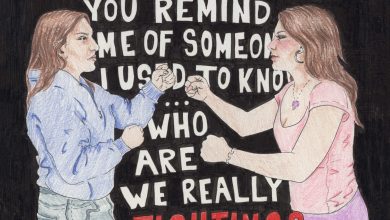Suffering in Silence: Uncovering Emotional Abuse

Illustration by Katherene Quiteno.
How do we know what emotional abuse is? Where do we draw the line between abuse and a partner being mistreated? Is emotional abuse even real? Isn’t physical abuse worse than emotional abuse? All of these questions rattled my brain when thinking about the issue of emotional abuse in romantic relationships. Emotional abuse is an issue rarely addressed and it is almost always overlooked in comparison to physical abuse. According to this emotional abuse help guide by leaving abuse, emotional abuse is “Any type of abuse that affects a person emotionally.” Examples of emotional abuse “may involve name-calling and other forms of verbal abuse, belittling, manipulating or intimidating.” For example, the abuser may isolate the victim from their family and friends to make them dependent upon the abuser. Even though the abuser emotionally manipulates and controls the victim, they are more likely to return to their abuser due to the isolation. This can start a vicious cycle of mental and emotional abuse.
Emotional abuse in romantic relationships is often overlooked because it is difficult to recognize the symptoms. It also isn’t as stigmatized as physical abuse because the signs aren’t as apparent.This is because it has become normalized in American society. As stated in Women’s Health Gov, emotional abuse can be a gateway to other forms of abuse which makes it especially dangerous: “You may feel like if you’re not being hurt physically, you are not being abused. But attempts to scare, isolate, or control you also are abuse. They can affect your physical and emotional well-being. And they often are a sign that physical abuse will follow.”
According to Professor Jorja Leap, ”Emotional and physical violence between partners is often about power and control. Aside from being difficult to prove, emotional abuse is also extremely subjective. Yelling, swearing, or profanity can be normal in some households and taboo in others.”
Additionally, people who identify as female are constantly put under immense pressure to project an adequate amount of femininity. In western American society, femininity is associated with being weak and passive, whereas, masculinity is associated with being tough and strong.
Marlina Mossberg, a current UCLA student and third year communication studies major states,“Emotional abuse comes in many forms, from subtle criticisms to outright manipulation. The problem is that because it’s not as obvious as something more direct and physical, it’s easier to sweep under the rug. Especially for young girls, who are taught to be accommodating and accepting, it’s easy for us to make excuses and justify the pain but at the end of the day we are made powerless without realizing it.”
When asked if she has ever been a victim of emotional abuse Mossberg stated, “I’ve had experience with guys who have controlled the situation in order to get what they want physically, without taking into account how much it affected me emotionally. This is a form of emotional abuse because even if we tell ourselves we are independent and in control, it’s actually putting us in a very passive role. I think women are reluctant to speak out because it makes us seem needy and difficult, so it’s easier to pretend to ourselves that everything is okay.”
This is another example of how gender stereotypes wrongly perpetuate emotional abuse and socialize women to accept this kind of mistreatment. Women are expected to provide emotional labor, because it is a part of their gender representation according to Western American society. It became normalized for women to display their emotions because in comparison to men, they are the “emotional” gender. People who identify as male must instead hide and repress their emotions in order to reinforce their masculinity. Showing emotion would be considered too feminine and therefore does not conform to American society’s binary gender roles.
In contrast, women are expected to be the “emotional” gender but at the same time they are socialized to be passive. Consequently, they have come to accept emotional abuse as a more normalized form of abuse. Emotional abuse is a very real issue and is just as detrimental, if not more so, than physical abuse. It is a subject that needs to be talked about more so that as a society, we can work towards combatting this harmful reality.




